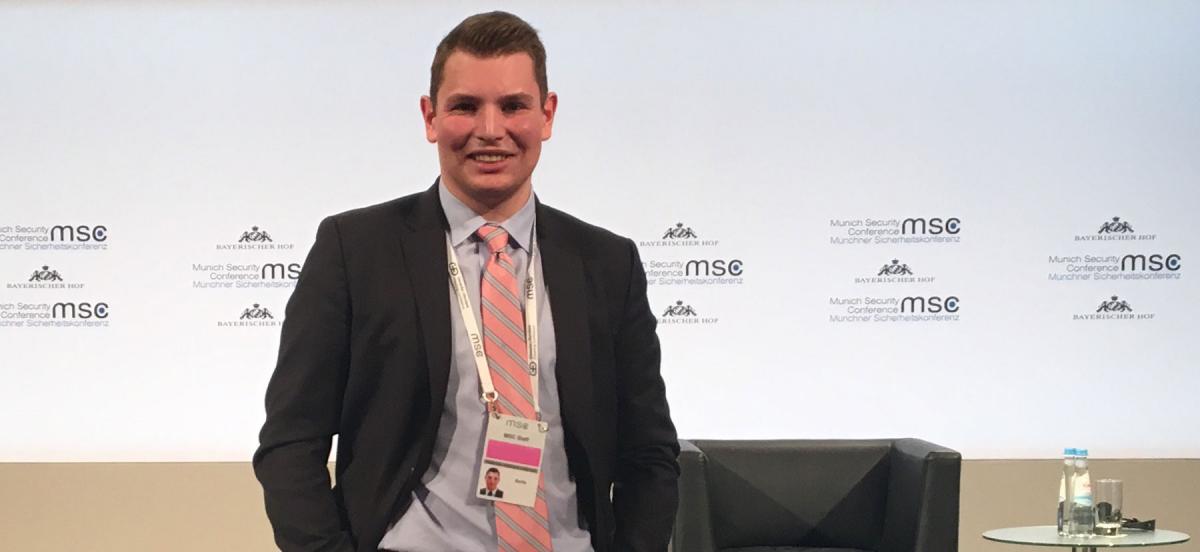A Haverford Ambassador at the Munich Security Conference

Details
Political science major Nick Barile '18 won an essay contest to attend the annual conference on international security policy where prime ministers and other political leaders, senior intelligence and defense officials, and CEOs from around the world gathered to debate current and future challenges.
One day Nick Barile '18 was on campus conducting senior thesis research on NATO strategy to deter to the Russians from moving into the Baltics, and the next he was sitting in the same room with the recent former secretary general of the very intergovernmental military alliance he had just been studying. Such are the perks of winning an international essay contest and being named junior ambassador to the 2018 Munich Security Conference.
The MSC is an annual event—the largest of its kind—that brings together world leaders and other international security policy decision-makers in Germany for three days of intensive debate about current and future security challenges. Speakers at this year's event, under the slogan "To the Brink—and Back?," included prime ministers of the U.K., France, Turkey, Poland, and Iraq; U.S. National Security Advisor H.R. McMaster; former and current United Nations secretaries-general; Former Secretary of State John Kerry; CIA Director (and current Secretary of State nominee) Mike Pompeo; President of the European Commission Jean-Claude Juncker; international CEOs and ambassadors; and former Vice President Joe Biden.
With his winning essay, "Averting the Unthinkable: Tactical Nuclear Weapons Reduction Framework for Europe," Barile earned a spot alongside two other junior ambassadors from Russia and Germany at the prestigious conference. By attending, the Haverford College political science major hoped to better understand the global security environment, which he says is "unravelling" in 2018, and learn what the most powerful security practitioners in the world are doing to stop that unravelling.
"How are we going to deter Russia from interfering in future elections?" he said. "How are we going to salvage what’s left of nuclear arms control agreements? How are we going to prevent a second Korean War? What can be done to lift liberal democracies up from their fragile state? I came to the MSC because I wanted to hear answers to these problems. I also hoped to pose questions to the diplomats, experts, and journalists that take part in the conference. Above all, I hoped to have a dialogue with my fellow junior ambassadors from Russian and Germany in this time of transatlantic tension."
Barile was also able to gain some direct, first-person research for his forthcoming thesis, which explores the logic of “tripwire” deterrence in modern security environments.
"Hearing from the decision-makers that implement deterrence strategies was quite helpful for my thesis," he said. "In particular, I found former NATO Secretary-General Anders Fogh Rasmussen’s talks to be very illuminating. Secretary Rasmussen spoke about how NATO has worked to make its 'red lines' unclear and ambiguous—basically, adopting the posture of strategic uncertainty' that my thesis is exploring."
Though there were many famous names from the news and his textbooks, Barile's favorite moments from the conference were spent in the company of his fellow junior ambassadors, especially his daily breakfasts with his Russian colleague.
"Even though there is considerable hostility between our two governments, I really enjoyed our conversations," said Barile. "Promoting mutual understanding between our two countries is vital. There are still a lot of areas of potential cooperation, and we need to keep encouraging dialogue between the citizens of our countries."
Barile took over the College's Snapchat account during his three-day stay in Munich, hoping to give his fellow students back on campus an insider's view of the conversations between global power brokers to help them understand how decisions made at the conference could impact their lives.
"As Haverfordians, we’re taught to be globally conscious," he said. "So it’s important to me that we keep an eye on what’s being said and done at influential gatherings like the MSC. What the conference organizers do is so important—they make it possible to question and challenge leaders who might otherwise evade scrutiny. It was such an honor to have a front-row seat to these discussions, and I’m so grateful to the Haverford Political Science Department and the MSC for making it possible."



